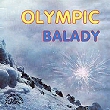|
|

Olympic You can't talk about the Czech rock scene and not mention this group. In 1963, Olympic became the first rock band officially recorded and released by the Czech Communist government. The two founding members kept the band going for over 30 years and their 12 albums of original recordings sold well over million copies. According to the band's own statistics, over the years they have recorded almost 400 originals, played nearly 6000 concerts (about a third of them abroad) and drank about 14000 gallons of beer - plus 3 glasses of lemonade... This compilation CD contains 17 songs from their first 20 years. All of them were composed and are sung by Petr Janda, Olympic's guitarist and leader. But since there is absolutely no additional information anywhere on the CD, unfortunately this uniformity of sound and style soon leads an uninvolved listener to boredom. It is my hope these notes will provide at least some guidance for those without any emotional ties to the songs. The first two cuts originally recorded in 1967, come from Olympic's first album Zelva (Turtle). Both feature awkward lyrics and charming Beatles-like melodies. The next two, Andel (Angel) and Otazky (Questions) with a new lyricist bring us Leonard Cohen's folksiness while Danny and Bon Soir Mademoiselle Paris (all from 1970), combine 'Hey Jude' with Donovan's 'Atlantis'. Between 1970 and 1974, the band undergoes personnel and stylistic changes until they emerge with a new pop oriented style and rather complex vocal harmonies on the appropriately titled Uz je lip (Things Are Looking Up). On (He) and Taky jsem se narodil bos (I Was Also Born Barefoot) from Marathon (1977) when Janda was 28, feature their first shy use of synths and phony sounding retrospective lyrics by an older non-rock lyricist. Co vsechno se tu muze stat (Everything That Can Happen Here) carries an ecological message; The rest of the songs from the early 80's were all penned for the elusive 'Bratislava Lyre' competition in a general Pink Floyd/Yes/Genesis style. So what to make of all this? On one hand, Olympic has never been rebellious enough either musically or politically. On the other, Janda was always able to incorporate the latest musical trends into his own writing. This timidness and willingness to participate in 'Star Search' like pop music competitions allowed them to function as a pet rock band of the Communist government. And because of their awareness of hip Western trends, they stayed popular with their audience. Ultimately however, it was the political changes of the country that brought about the end of Olympic's long musical carrier. Copyright © 1997 Ivan Sever
|
| © 2011 Luna Kafé |